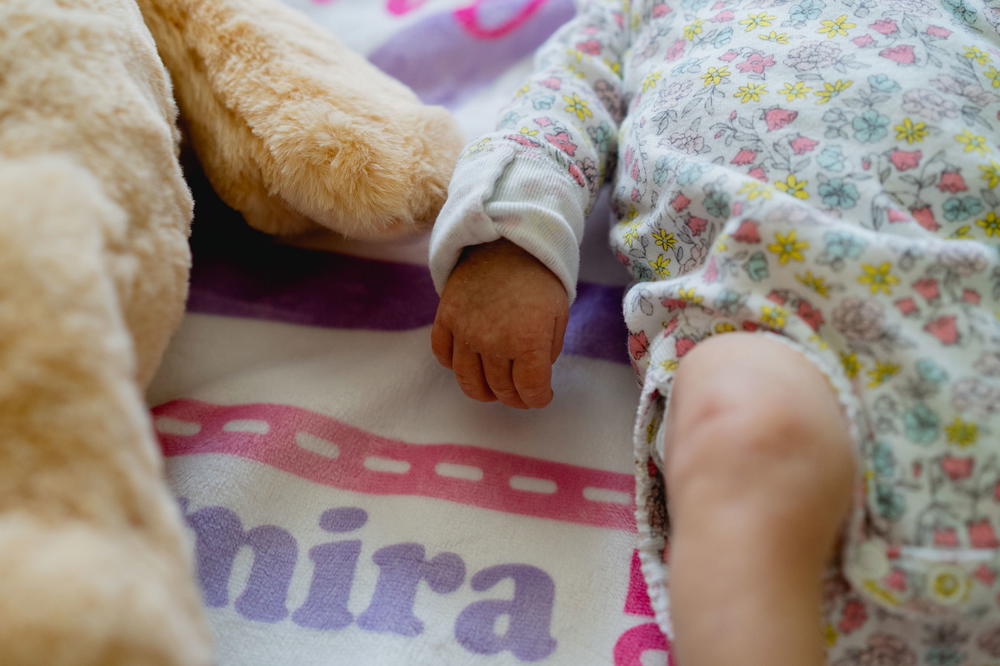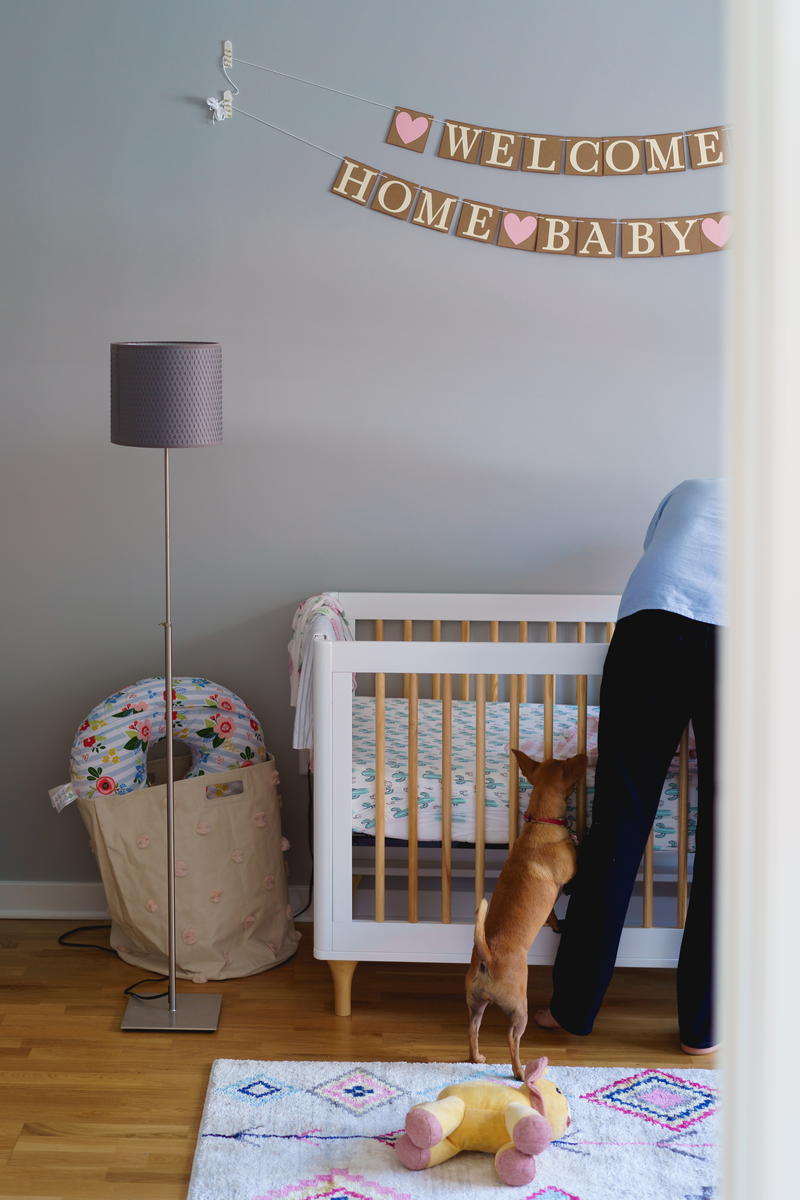Where Should My Newborn Baby Sleep for the First Few Months?

Deciding where a newborn should sleep is a personal preference. I had a strong opinion on it, so you can see my story here, about where our newborn slept when I gave birth.
This article may contain affiliate links. We earn a small commissions when you purchase via those links — and it's free for you. It's only us (Becca & Dan) working on this website, so we value your support! Read our privacy policy and learn more about us.
Giving birth and having a baby come home seemed straightforward to me, before it all happened. the baby comes home, sleeps all the time and it’s like a dream come true, right?
In the weeks leading up to our baby being born, I realized I found myself talking to lots of parents about where the baby should sleep. I was overwhelmed with choice, and ultimately, we got into doing what we thought worked best for us, as tired new parents with a newborn.
In this list, I’m going through all the possibilities of where your baby could sleep, and the pros and cons of each scenario. I think this may help you quite a bit.
Option 1: Newborn sleeps in the parents’ bedroom
It would seem natural that a newborn would sleep next to his or her parents, in their bedroom, for up to 3 months, or 6 months. After all, newborns wake up a lot, and need to have milk every 2-3 hours throughout the day. Having a newborn in a parent’s bedroom makes this simple, as parents are right there to feed the baby when they wake up.
Why this was not for me
I’m an extremely light sleeper. I’m such a light sleeper that, to my great disadvantage, I had a lot of trouble sleeping next to my newborn. Here’s why.
Newborns make a lot of noise. They can’t control their sounds, or what’s going on in their tiny bodies. The grunts and squeaks of a newborn made it impossible for me to sleep, when I slept next to my newborn.
Pros and cons to this option
- Pro: Having a newborn in a bassinet like the one we have, the Halo Swivel Bassinet, makes feeding the newborn convenient.
- Pro: For safety, it is ideal to have a newborn when you can see them, to make sure they are always breathing and comfortable. As Healthy Children recommends keeping the newborn in your bedroom to prevent the risk of SIDS.
- Con: Newborns are noisy. I couldn’t handle the intemittent “newborn sounds” and even a sound machine didn’t drown these out, for me.
- Con: Newborns wake up all the time. This means not one, but two parents, are losing sleep when the baby wakes up for a feed.
Conclusion
Having our newborn right beside me or nearby in a bassinet was NOT for me and it was not for us. Keep reading, to see what we did.
Option 2: Newborn sleeps elsewhere, while parents trade off
After one night of a newborn next to me in our room, I called it quits. I developed a plan.
Living in a two-bedroom apartment gave us three spaces: our bedroom, our baby’s room and our living room with a couch.
The plan was this: each parent would get half the night. I’d get half the night, and Dan would get half the night, sleeping in our bedroom in our bed. I would go to bed early, to make this work (I was so tired from nursing around the clock, as it was). Dan would stay up late, or fall asleep on the couch, and feed our newborn with a bottle when she woke up at any point.
The idea was for me to get some uninterrupted sleep, but also feed our baby during Dan’s living room hours, and then go back to bed. At the very least, it was how he could help me during nursing.
This worked for months, with some success and some challenges, but overall, success in our own way. To make it work, I’d go to bed at 8pm, which eventually became 8:30 and (whoa!) then 8:45pm. As our newborn slept for 3 hours at a time, and eventually, four hours at a time, I was able to feed her only once between my bedtime and my hour to switch.
Around 2am, we’d switch spots. I’d sleep on the couch for the rest of the night and would feed our newborn when she woke up. Dan would sleep in the bedroom from 2am til about 8 or 9. We were (almost) getting as much sleep as we needed.
All this method required was figuring out where we wanted the bassinet to “live.” As we edged toward having a second child, knowing where we’d put the bassinet fell into things to do before the baby arrived.
Why this worked for us
I need a dark room, peace and total quiet to sleep, like I mention in how I got sleep as a parent with a newborn. This method almost got me there. I also acknowledge that this wouldn’t have worked if I had had to go back to work at 3 months postpartum, but that’s another topic. Dan went back to work at 5 weeks after the birth of our baby and this helped him out a lot, too.
Pros and cons
- Pro: Both parents get to sleep in the bedroom at different times, without the newborn’s noise and cries. Each parent might get to pack in more sleep hours during a day, like we did.
- Pro: One parent is with the newborn at all times in another room (living room, family room, nursery with a couch), etc. This helps with the newborn’s safety and protects against SIDS.
- Con: This creates a pretty bleak situation for romance and feeling like a couple who sleeps together in the same bed; however, with a newborn in the room, I can’t see how that improves things at all!
Option 3: Newborn sleeps alone in nursery, parents use a monitor
We only have one set of friends who immediately put their newborn in her nursery and put on a baby monitor to see her sleeping there.
This was not for us, and that was mainly because as first-time parents, we did want our newborn to be near at least one of us while sleeping during the night.
You will find that most parenting and pediatric sources regard against this, because according to Kids Health, yes: the American Academy of Pediatrics says parents should share a room with their baby for the first six months (many parents will find this is not their style).

So, want your newborn out of your room after the first few weeks? Here are the pros and cons.
Why this wasn’t for me
I wanted our baby close, for feeding (from one of us) and to make sure she was alive (yes, first time parent nervousness here!). With a baby monitor, it wasn’t as clear. We wanted to be able to run over and see her, if she made a strange noise or sounded like she was having trouble breathing.
Pros and Cons
- Pro: You can get your newborn out of your bedroom if they’re noisy and you, the tired parent, can’t sleep.
- Pro: You can get your bedroom back to be your space!
- Con: If your newborn makes a strange sound, you’ll be farther and through two bedroom doors, to go see what’s going on.
- Con: Baby monitors sometimes die (ours did!) and you wouldn’t want to miss your newborn’s hunger cues.
Conclusion
We ultimately moved our baby to her crib and in her minimalist nursery I was so proud of, when she was four months old. This felt right to us. She was out of the newborn stage and this worked well, even though there were still two or three nighttime wake-ups for another few months.
Option 4: Co-sleeping with a newborn
This subject is the one I have the least experience with, because we never slept in the same bed as our baby. Also, it is a less popular practice in the US, where Western practices tend to override the popularity and safety of cosleeping with a baby.
However: if you learn more about the topic of cosleeping, which I have, I’ve learned that this is a highly common practice throughout the world, from Latin America to Africa to Asia. Most parents all over the world share beds with their babies from the first day of birth, in order to be close to them, ensure their safety and feed them whenever the baby is hungry.
Natural Child describes cosleeping in a great way, noting that it is both a common practice and decreases the risk of SIDS.
The only times I have met other women who coslept with their newborns was in my postpartum support group.
Why this isn’t for me
I’m an incredibly light sleeper, so having another person in the bed, like a fragile newborn, is nothing I want to get into. Also, the fact that newborns make so much noise made me want to be as far as possible from mine when it wasn’t my “shift.”
Cosleeping is beneficial for some parents, and for others, it seems foreign or bizarre. Make sure to bring it up in conversations to have before the baby comes.
Pros and cons
- Pro: Parents can be next to their newborn and feed them on demand.
- Pro: Parents can help a newborn to be safe and closely monitored. It also helps a newborn smell their parents, which creates a sense of security.
- Con: Parents who toss and turn during their sleep should NOT sleep in the same bed as a newborn.
- Con: Parents who drink or smoke should also NEVER be in the same bed as a newborn.


